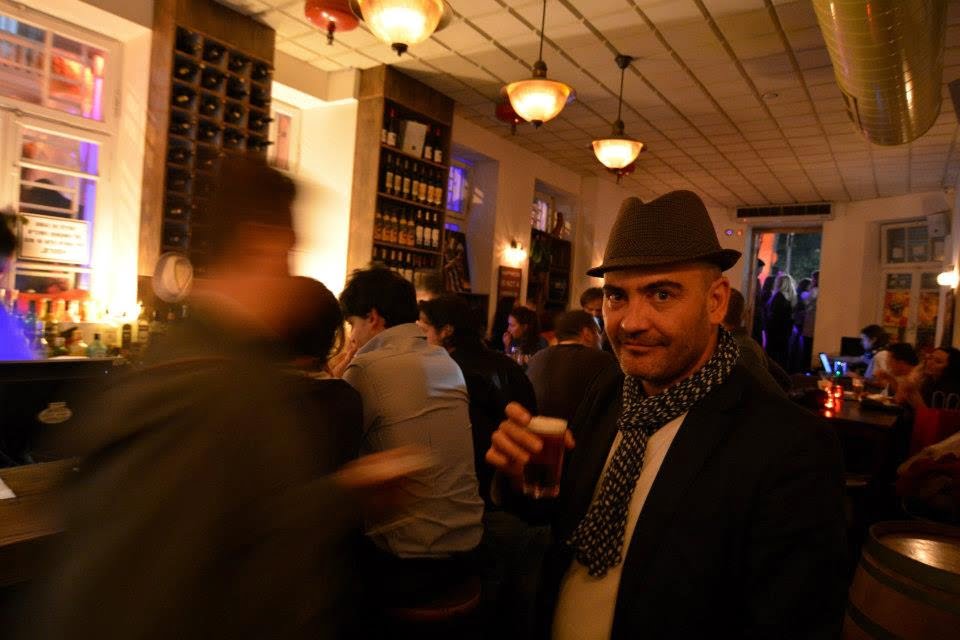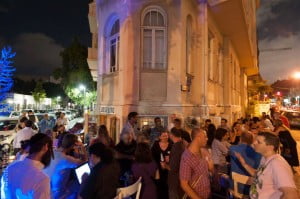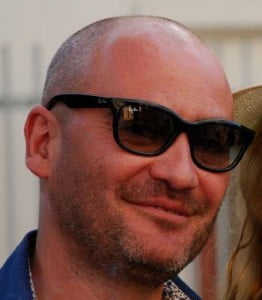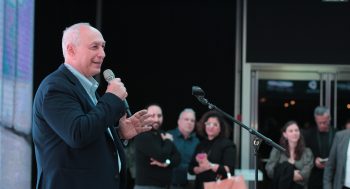José Abad is your typical Catalan: stout and broad of stature, with a mischievous smile always ready to burst into laughter and a cunning mind for business. Born in Barcelona, where he studied industrial engineering, he lived both in London and Shanghai before moving to Israel, a few years back. He didn’t come on a whim, though. It only took him a few days, during a visit to Israel, to realize the country’s business potential. What began as a short trip, ended with him moving to the holy-land. Without knowing any Hebrew, he now runs a private venture fund, J.B.L.-Group, alongside his business partner Barack Ettinger, an Israeli he met while they were both working in China. As their business grew and prospered, they decided to open a bar together: Joselito.
The story of J.B.L.-Group: born in China, raised in Israel
I sat with José Abad one warm Saturday evening on Joselito’s terrace in order to learn more about his projects, as well as his thoughts as a businessman and entrepreneur in the startup nation. As the streetlamps flickered on, we sat with a couple of small Spanish beers between us and a plate of nibbles to munch on while his story unfolded.
Abad began working in solar energy seven years ago, in Shanghai, China, where he met his business associate Ettinger. They became friends and started to work together. “Originally, we only focused on providing solar panels for photovoltaic energy projects,” he says. It would be in Israel where their company would later expand its horizons.
José Abad came to Israel by chance. He explains: “I’d come for Barack’s wedding and we both realized the great potential this place offers for business. Not only is there money, there are many people willing to provide private capital.” They decided to broaden their company’s operations by starting a private fund with Israeli capital for investing in renewable energies, especially photovoltaic technology. That’s how J.B.L-Group was born.
“What we do now is buy projects while in their initial stage, the inception. We provide equity for all initial development and, when ready to be connected to the network, we also provide finance.” Most of the promoters they work with (and the projects they invest in), are based in South America: Argentina, Mexico, Chile (according to José, one of the biggest potential markets), but also in Eastern Europe, especially Romania.
Embracing Israeli startups
And of course, an investment group couldn’t land in the startup nation without investing in a few local startups. José tell us that a startup’s most important aspect, which makes it worth investing in, is “the human team behind it.” He explains that if the team behind a project – even a potentially good one – isn’t professional enough, then the project isn’t worth the investment.
Following this criteria, J.B.L.-Group is currently working with bSolar, an Israeli startup which increases solar cell efficiency up to a 25 percent. “Basically, they enabled the backs of solar panels to create energy from reflected light. So apart from the direct solar light captured by the panel’s main face, they create 25 percent more energy by harnessing the reflected light captured by the other side.”
They have also laid a foot inside Israeli startup’s startup territory per excellence: technology. J.B.L.-Group decided to bet its money on a startup called UnusID, a smartphone app that allows you to create one or various business cards, so that when somebody adds your telephone number to his list, you can choose which business card to share with them. The chosen information will then download onto the other person’s phone. “Isaac Benzaquen is the senior partner, a Spaniard who’s been living here for four years, a good professional at the head of a very professional team.”
Israel, solar energy and private venture
José Abad sees private funds as profitable nowadays. He reckons that due to the global financial crisis, especially in Europe, banks aren’t giving out loans as easily anymore: “A few years ago, banks were the ones who provided equity capital and finance to develop photovoltaic projects. Now, not a single bank would do it, especially for solar energy projects. What bank would finance that?”
Sign up for our free weekly newsletter
SubscribeHe goes on to explain that banks would usually provide between 60 and 80 percent finance and some also provided equity. That’s why private loans are prospering, notably in Israel. With companies like J.B.L.-Group, investors obtain an internal rate of return (IRR) of 13 to 16 percent, depending on the project, with a repayment period of about 15 years.
José Abad believes the reason for which Israel is such a good environment for business is “the Israeli people’s enthusiasm for doing business; their willingness to sit down with you at any hour, in any place, to listen to your proposals and see if you can work something out together.”He also points out that, despite not being Jewish, he acknowledges how the Jewish network, through its contacts and project owners worldwide, “works, and it works very well.”
Something amused José about the Israeli solar energy panorama, though: “Funnily enough, we don’t have a single client in Israel.” The country has contributed great technological contributions to the solar energy field. Nevertheless, Abad says that the bulk of these advances have practically not been applied and developed on Israeli soil: They’ve been exported. “It’s a paradox that in Israel there are so few solar energy projects. Okay, there might be a few in the desert, but taking into account this country’s solar radiation, not to mention its potential, the development of photovoltaic parks is small.”
Joselito, a place for business and beer
José Abad laughs that Joselito “was a crazy idea.” Ever since José and Ettinger met in China, they fantasized about opening a bar together. And so, once settled in Israel, they decided the moment had arrived. It now sits in central Tel Aviv, a block away from Rothschild Avenue: an elegant Spanish bar with a terrace. The dimly lit, underground pub has walls lined with red wine, pictures of Barcelona Football Team and even an autographed Lionel Messi jersey.
“In a way, for us it was a sort of startup.” Funded solely with their personal capital, Joselito is intended to be “a mini Barcelona in Tel Aviv.” As promised by their slogan “Bar. Ochel (Hebrew for ‘food’). Barcelona,“ clients can indulge in small Spanish tapas dishes and down some cool San Miguel beer, served in the typical Spanish beer sizes: the caña (6 to 10 ounces).
With Joselito, Israel revealed yet another surprise to the ever-learning Spaniard: “Bars carry out a big role in the business world of Tel Aviv.” He discovered, amazed, that many meetings take place in bars or cafeterias in a casual manner, instead of in official meetings in offices. Joselito became, as Mateo Rouco defined it in his article for Spanish newspaper El Mundo, an informal business center. Abad is enthusiastic about it: “Joselito has helped us immensely to make deals and meet clients. You’ll talk to someone at the bar and say, Oh, I work in a fund of something-or-other; ah, well I’m working in renewable energies! Ok, so let’s meet up tomorrow and see if we can organize something.”
For José, this is one of the aspects that make Israel – particularly Tel Aviv – such a fertile business environment. “I’ve not seen this attitude in any other place; it’s something truly Israeli,” he muses, “the bar as a business platform. An informal office. Meetings without suits, without ties… Even in shorts, during summer!”
The Israeli people’s attitude for business, the country’s huge investments in R&D and technology and Tel Aviv’s recent listing as the second city with most startups per capita after Silicon Valley have created a perfect ground for José to build up on a prosperous business life, but it also has also set him thinking: “If this continues, well, maybe in ten, twenty years this country could be what Japan was ten or twenty years ago.”
Photos: courtesy
Related posts

'Startup On Steroids': Civilians Raise $3.7M To Equip IDF Troops

Comeback Kid: WeWork Founder Plans A Real Estate Revolution








Facebook comments